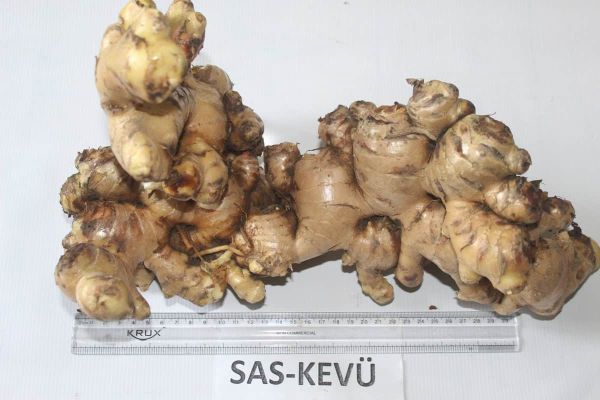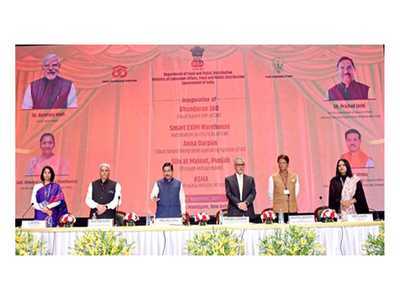
A new ginger variety named SAS-KEVÜ has been developed by researchers at Nagaland University in Kohima.
The ginger variety consistently delivers superior yield, dry matter recovery, and culinary quality, making it a high-value option for farmers, the fresh produce market, and the spice-processing industry.
Taken up under the All India Coordinated Research Project (AICRP) on Spices, located in Nagaland University, SAS-KEVÜ emerged after nearly a decade of scientific evaluation and extensive multi-location testing across seven AICRP centres in India.

The research was led by Prof C S Maiti and Dr Graceli I. Yepthomi from the School of Agricultural Sciences, Nagaland University.
The SAS-KEVÜ was formally notified by the Sub-Committee on Crop Standards, Notification and Release of Varieties (Horticultural Crops), Ministry of Agriculture and Farmers Welfare, and published in the Gazette of India (No. CG-DL-E-04092025-265957) on 2nd September 2025.
The Potential
The new variety promises a yield potential of 17.21 tonnes per hectare. SAS-KEVÜ outperformed the national check variety by more than nine per cent in demonstrations. Its dry recovery rate of 21.95 per cent offers a strong advantage for processors looking for higher output during drying, say the researchers.
The rhizomes exhibit a soft texture, bold size, and lemon-yellow flesh with significantly lower fibre, enhancing both consumer appeal and suitability for pickles, beverages, culinary use, and value-added products.
Prof Jagadish K Patnaik, Vice-Chancellor, Nagaland University, said, “This landmark achievement is the result of nine years of rigorous, coordinated national trials carried out by our team of scientists in collaboration with partner institutions. ‘SAS-KEVÜ’ has been specifically developed to deliver higher yields, improved quality, and greater resilience, offering farmers a reliable variety that can substantially enhance their incomes.
“The release of this variety is expected to strengthen India’s ginger value chain, promote regional agri-innovation, and support the broader national vision for sustainable and profitable horticulture. Nagaland University remains committed to scientific excellence, farmer welfare, and the advancement of agricultural research in the North-East and beyond,” he added.
Applications and industry use
Food processing Industry users will benefit from SAS-KEVÜ’s moderate oil content and pulpy bold rhizomes, which align well with requirements for candy and ginger paste.
For farmers, the variety’s combination of high yield, high market acceptance, and desirable rhizome traits translates into improved returns per hectare. The crop matures in nine months fitting well into the production cycles of regions where ginger is traditionally grown.
Tracing the journey of this project, Prof C S Maiti, Department of Horticulture, School of Agricultural Sciences said, The variety’s journey began in 2014, when 19 clones of the local Nadia ginger were collected from growing areas of Nagaland and studied in detail for their morphological and biochemical traits. From these, the clone NDG-11 — later named SAS-KEVÜ — was identified as the strongest performer. Between 2018 and 2022, it was evaluated under national coordinated trials in Chintapalle (AP), Kozhikode (Kerala), Mizoram, Nagaland, Potangi (Odisha), Pundibari (WB), and Sikkim. Stability analyses, including GGE Biplot evaluations, confirmed SAS-KEVÜ’s ability to perform well across varied agro-climatic zones, particularly in Nagaland, Pundibari in West Bengal, and Chintapalli in Andhra Pradesh.”
Dr Graceli I. Yepthomi, Assistant Professor, added, “With the Central Government’s notification under the Seeds Act, 1966, SAS-KEVÜ is now approved for seed production and agricultural sale in Nagaland, Mizoram, West Bengal, and Andhra Pradesh”.
The variety, developed by AICRP (Spices) team from Nagaland University is also recorded as the first Ginger variety from the research institute of North East States in India.
By offering farmers a high-yielding, market-ready, low-fibre variety, the university aims to improve household incomes, reduce post-harvest losses, and support India’s growing ginger-based industries. Preparations are currently underway at the university to scale up seed rhizome multiplication so that farmers can access planting material ahead of the next cropping season.
Nagaland University anticipates that SAS-KEVÜ will play a significant role in advancing ginger cultivation across the Northeast and other notified states, supporting both economic development and agricultural resilience.
-
On Zubeen Garg's birthday, Shah approves action against singer's death accused

-
Arsenal fears over Gabriel injury grow as January timeline laid out for return

-
M4 traffic LIVE: Rush hour chaos on major motorway as crash sparks closure

-
Union Minister Pralhad Joshi announces major digital upgrades to strengthen food storage, logistics

-
SAS warning Labour is driving special forces out of military
